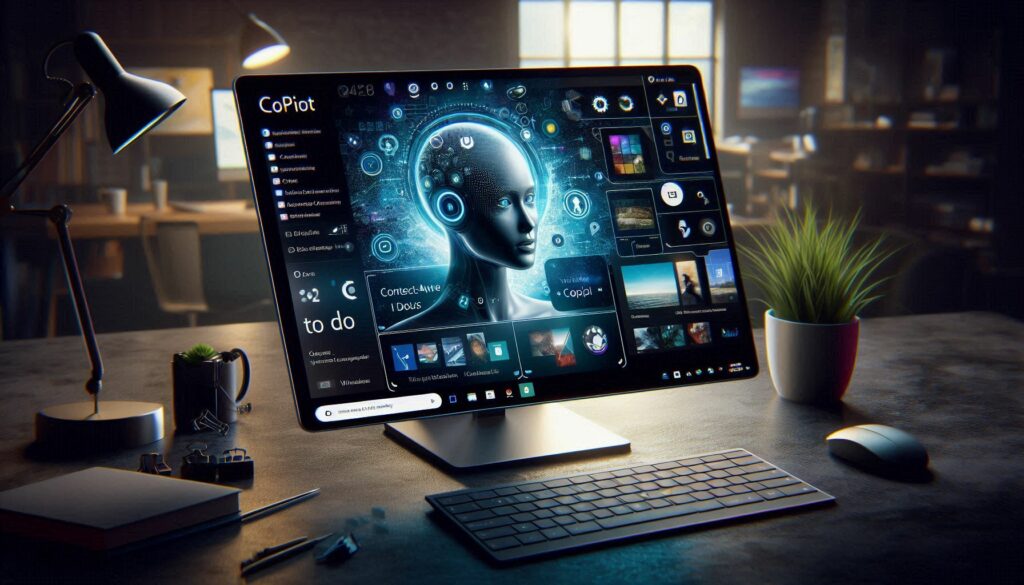
AI CERTS
7 months ago
Microsoft Launches Groundbreaking AI Features for Windows PCs Amidst Rising Competition
In a significant stride toward enhancing user experience, Microsoft has unveiled a suite of major updates to its Copilot artificial intelligence platform for Windows PCs. Announced during a press event at the Microsoft Experience Center in New York, these updates expand Copilot’s capabilities, allowing users to interact directly with the AI assistant. As the tech giant aims to solidify its foothold in the competitive landscape, these new features signal a robust AI push across both consumer and enterprise markets.

Key Updates to Microsoft Copilot
- Direct Interaction with Copilot: One of the standout features introduced is the ability for users to speak directly to Copilot. This interactive capability facilitates more natural communication and task management, aligning with the growing trend toward voice-enabled technology. According to Gartner, nearly 30% of web browsing sessions will involve voice search by 2025, highlighting the increasing demand for conversational interfaces.
- Context-Aware Click to Do Option: Microsoft’s new Click to Do feature provides context-sensitive toolsets that empower users to perform actions based on what is visible on their screens. By pressing the Windows key and clicking the mouse, users receive a pop-up toolbox for tasks like removing or blurring backgrounds in photos or performing visual searches via Bing. This feature aligns with findings from Forrester Research, which indicate that 70% of users prefer interfaces that understand their context.
- Revamped Windows Search: The updated Windows Search now allows users to search for files and photos using natural language descriptions instead of exact names. This enhancement aims to simplify the search process, making it more intuitive. A survey by Statista revealed that 63% of users find traditional file searching cumbersome, underscoring the need for more user-friendly search options.
- Photo Editing and Upscaling Tools: Microsoft introduces AI-driven tools for photo editing, including an AI-powered editing tool that can erase or add objects in images. Additionally, users can upscale older photos to 8K resolution, allowing them to rejuvenate cherished memories taken on older devices. According to Adobe, nearly 40% of consumers want advanced editing tools integrated into their software, showcasing a clear market demand.
- Copilot Vision: This cutting-edge feature is currently available to select Pro subscribers through Copilot Labs. Copilot Vision can analyze users’ Edge browser screens and respond to queries about the content displayed. For instance, users can inquire about movies while browsing Rotten Tomatoes, with Copilot suggesting options based on what it “sees.” Microsoft assures users that no conversation data is saved post-session, reinforcing its commitment to user privacy.
Security Enhancements Amid Criticism
Despite these innovative features, Microsoft faced criticism regarding the security implications of the Windows Recall feature, which captures screenshots to create a visual library of user activities. Security experts raised concerns that hackers could exploit this feature to compromise user information. In response, Microsoft has enhanced the security architecture of Recall, making it an opt-in service with improved protection against potential threats.
Strategic Timing for Holiday Shopping Season
The timing of these updates coincides with the upcoming holiday shopping season, a critical period for consumer electronics sales. By enhancing its Copilot+ PCs just as demand begins to rise, Microsoft aims to attract consumers and capitalize on renewed interest in personal computing. A recent report by NPD Group indicated that PC sales have started to recover, with an increase of 8% year-over-year in the last quarter.
Competitive Landscape
As Microsoft expands its AI capabilities, it faces rising competition from Apple, which is set to launch its own AI features for macOS in the coming months. This impending rivalry marks a pivotal moment in the tech industry, as both companies vie for dominance in the evolving landscape of AI-driven personal computing.
Conclusion
With its latest updates, Microsoft demonstrates its commitment to innovation and user empowerment in the digital space. By integrating advanced AI functionalities into Windows, the company not only enhances the user experience but also positions itself favorably against competitors in an increasingly competitive market. As the tech landscape evolves, Microsoft’s strategic advancements in AI technology could redefine how users interact with their devices, setting a new standard for personal computing.